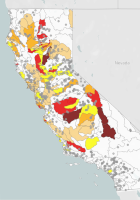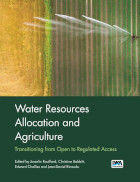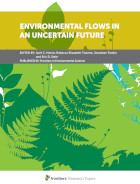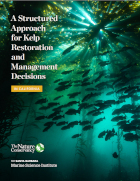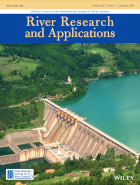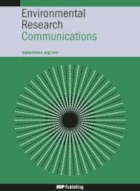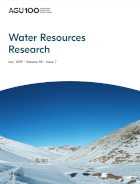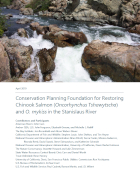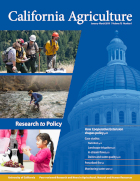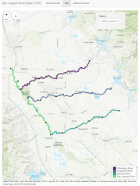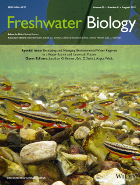Julie Zimmerman
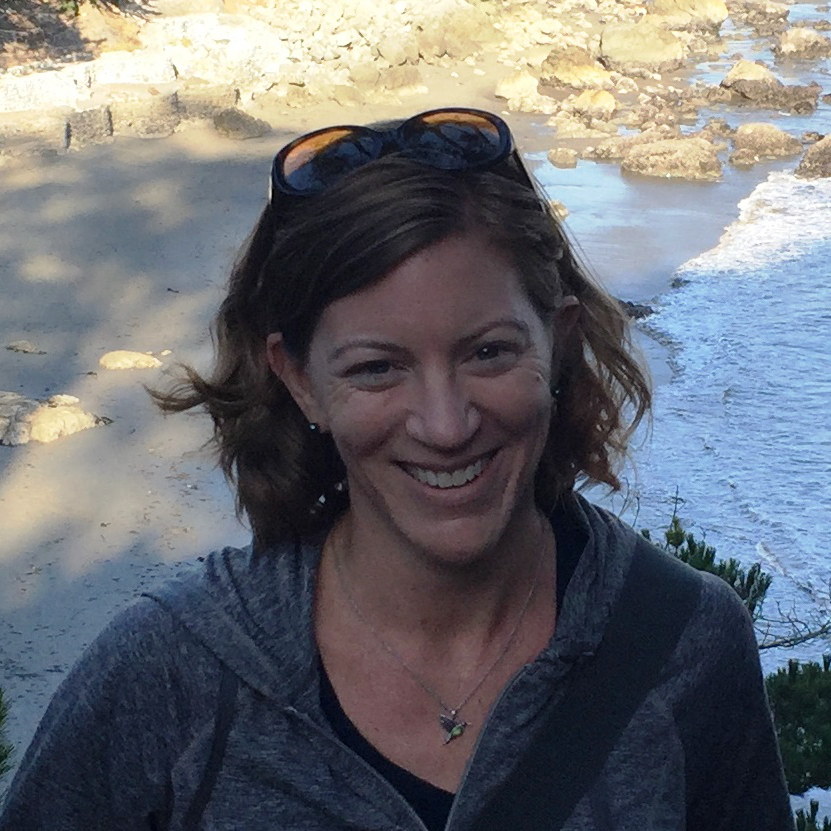
Director of Science
Freshwater
[email protected]
Julie Zimmerman is the Director of Science for the Water Program in The Nature Conservancy’s California Chapter. Julie leads the water science team to provide the innovative and sound science that is crucial to design and implement the projects and policies necessary to secure a sustainable water future for people and nature. Julie’s focus is to develop collaborative, science-based approaches to water management, environmental flows, and river restoration in California.
Before joining the Conservancy in California, Julie was a Fish Biologist with the U.S. Fish and Wildlife Service (USFWS) and a River Ecologist with the Conservancy’s Connecticut River Program and Chesapeake Bay Program. Julie holds a B.A. in Environmental Studies and Geography from University of California, Santa Barbara, an M.S. in Ecology from Colorado State University, a Ph.D. in Fisheries from University of Minnesota-Twin Cities, and an expert certification in Decision Analysis from the National Conservation Training Center. Julie’s research experience ranges from mountain streams in Puerto Rico, trout streams in Minnesota, large rivers in the Northeast and mid-Atlantic, to rivers throughout California.
What Julie is working on now:
I’m currently working with academic and agency partners to develop ecological flow criteria for every stream in California and a companion framework and associated case studies to guide implementation of instream flows that are protective of aquatic ecosystems. I’m also working on predictions of natural and actual flows in ungaged streams throughout California, making those data available on a webapp for use by agency staff and instream flow practitioners, and analyzing these flow data to provide assessments of flow alteration for streams and rivers and to monitor drought conditions though time.
Select products
2023 | Freshwater | Microsite
Drought Flows Monitor
Julie Zimmerman, Jennifer Carah, Kirk Klausmeyer, Gabe Rossi, Mia Van Docto, Jeanette Howard, Charlie Schneider, Matt Clifford, Monty Schmitt
Drought conditions are occurring with more frequency, greater severity, and longer duration under climate change. Human water use compounds the effects of drought, further stressing California’s…2022 | Freshwater | Science | Publications & Reports
Water Resources Allocation and Agriculture: Allocations and Environmental Flows
Eric D. Stein, Michael E. McClain, Ashmita Sengupta, Theodore E. Grantham, Julie K.H. Zimmerman, Sarah M. Yarnell
In this chapter of Water Resources Allocation and Agriculture, the authors provide insights on how to integrate environmental flows into water allocation for agriculture across the world. They argue…2022 | Freshwater | Technology | Science | Publications & Reports
Modeling Functional Flows in California’s Rivers
Theodore E. Grantham, Daren M. Carlisle, Jeanette Howard, Belize Lane, Robert Lusardi, Alyssa Obester, Samuel Sandoval-Solis, Bronwen Stanford, Eric D. Stein, Kristine T. Taniguchi-Quan, Sarah M. Yarnell, Julie K. H. Zimmerman
Protecting water in rivers is made more challenging by the lack of quantitative estimates of the amount of water required to protect river ecosystems. The authors developed a model and made…2022 | Freshwater | Science | Publications & Reports
Functional Flows in Groundwater-Influenced Streams: Application of the California Environmental Flows Framework to Determine Ecological Flow Needs
Sarah M. Yarnell, Ann Willis, Alyssa Obester, Ryan A. Peek, Robert A. Lusardi, Julie Zimmerman, Theodore E. Grantham, Eric D. Stein
Very few rivers have protections to protect flow for species and ecosystems, in part because of the complexity and resources required to develop ecological flow criteria - the amount of water needed…2021 | Freshwater | Science | Publications & Reports
The California Environmental Flows Framework: Meeting the Challenges of Developing a Large-Scale Environmental Flows Program
Eric D. Stein, Julie Zimmerman, Sarah M. Yarnell, Bronwen Stanford, Belize Lane, Kristine T. Taniguchi-Quan, Alyssa Obester, Theodore E. Grantham, Robert A. Lusardi, Samuel Sandoval-Solis
The first step to protecting rivers is figuring out how much water they need to protect species and ecological functions - known as ecological flow criteria. Scientists have struggled to develop flow…2021 | Marine | Planning | Science | Publications & Reports
A Structured Approach for Kelp Restoration and Management Decisions
Mary G. Gleason, Jennifer E. Caselle, Walter N. Heady, Vienna R. Saccomanno, Julie Zimmerman, Tristin Anoush McHugh, Norah Eddy
Global kelp forests are biodiverse and productive nearshore ecosystems that provide a wide range of ecosystem services, but they are at risk from both local stressors and global drivers of kelp loss.…2021 | Freshwater | Science | Maps & Webmaps
California Natural Flows Webapp
Julie K.H. Zimmerman, Daren M. Carlisle, Jason T. May, Kirk R. Klausmeyer, Theodore E. Grantham, Larry R. Brown, Jeanette K. Howard, Nathaniel Rindlaub, Falk Schuetzenmeister
Water is essential for California’s people, economy, and environment. Centuries of water management through dams and diversion have altered the flows in many streams and rivers, which can harm…2020 | Freshwater | Science | Publications & Reports
A functional flows approach to selecting ecologically relevant flow metrics for environmental flow applications
Sarah M. Yarnell, Eric D. Stein, J. Angus Webb, Theodore Grantham, Rob A. Lusardi, Julie Zimmerman, Ryan A. Peek, Belize A. Lane, Jeanette Howard, Samuel Sandoval-Solis
The authors of this paper are engaged in developing flow criteria for California Streams through California Environmental Flows Framework (CEFF) collaboration. The effort is funded by the State…2019 | Freshwater | Science | Publications & Reports
Cannabis and residential groundwater pumping impacts on streamflow and ecosystems in Northern California
Samuel C. Zipper, Jennifer K. Carah, Christopher Dillis, Tom Gleeson, Ben Kerr, Melissa M. Rohde, Jeanette K. Howard, Julie K.H. Zimmerman
Using a newly developed tool for estimating streamflow depletion from groundwater pumping, this study examined the impacts of ongoing groundwater pumping on streamflow and aquatic ecosystems in the…2019 | Freshwater | Science | Publications & Reports
Rapid and Accurate Estimates of Streamflow Depletion Caused by Groundwater Pumping Using Analytical Depletion Functions
Samuel C. Zipper, Tom Gleeson, Ben Kerr, Jeanette K. Howard, Melissa M. Rohde, Jennifer Carah, Julie Zimmerman
Reductions in streamflow from groundwater pumping can negatively impact water users and aquatic ecosystems but are challenging to estimate due to the time and expertise required to develop numerical…2019 | Freshwater | Planning | Science | Publications & Reports
Conservation Planning Foundation for Restoring Chinook Salmon (Oncorhynchus tshawytscha) and O. mykiss in the Stanislaus River
Prepared by Anchor QEA, LLC (John Ferguson, Elizabeth Greene, and Michelle L. Ratliff), Contributors and Participants: John Cain, Jon Rosenfield, Alison Weber-Stover, Stephen Louie, John Shelton, Tim Heyne, Brian Ellrott, Sierra Franks, Monica Gutierrez, Rhonda Reed, David Swank, Steve Edmundson, Katie Schmidt, Rachel Johnson, Jeanette Howard, Julie Zimmerman, Chris Carr, Daniel Worth, Rene Henery, Ron Yoshiyama, Joshua Israel, Paul Cadrett, Ramon Martin, and J.D. Wikert
Also view Appendix A: Stanislaus Survival Model and and other report Appendices.2019 | Freshwater | Science | Publications & Reports
Stream flow modeling tools inform environmental water policy in California
Theodore E. Grantham, Julie K. H. Zimmerman, Jennifer K. Carah, Jeanette K. Howard
Management of California’s vast water distribution network, involving hundreds of dams and diversions from rivers and streams, provides water to 40 million people and supports a globally…2018 | Freshwater | Planning | Science | Maps & Webmaps
Rearing habitat objectives to support salmon in the Central Valley
Travis M. Hinkelman, Myfanwy Johnston, Joseph E. Merz, Julie Zimmerman
To restore degraded stream corridors and develop large-scale, sustainable watershed conservation strategies, it is essential for managers to consider—in order to ultimately…2017 | Freshwater | Science | Publications & Reports
Patterns and magnitude of flow alteration in California, USA
Julie K H Zimmerman, Daren M. Carlisle, Jason T. May, Kirk R. Klausmeyer, Theodore E. Grantham, Larry R. Brown, Jeanette K. Howard
The importance of the natural flow regime to stream and river health has received growing attention in recent years. Understanding natural flows and patterns of flow alteration is an important first…